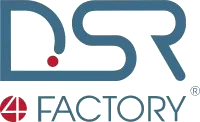DSR has implemented the APS 4FACTORY solution at Valmont Polska
Valmont, an internationally leading manufacturer of steel structures and irrigation systems for agriculture and provider of industrial services, has implemented the Siemens Opcenter APS (formerly Preactor) system, an APS-class tool for advanced production planning and scheduling. The decision to install the system was made due to dynamic development of the company in Poland and the need to organise processes related to production planning. DSR was responsible for carrying out the implementation.
Valmont Polska was established in 1994 as a joint venture project between Valmont Industries Inc. and Mostostal Siedlce SA. The manufacturing profile of the Poland branch includes steel poles for street and traffic lights, utility poles, support structures for tramway tracks as well as telecommunications towers.
The company faces fierce competition, which is why shortening the time it takes to respond to customers and precisely defining order delivery dates was of particular importance. The company offers a complete range of products under the “designed-to-order” model; this model assumes full customization of the order to the customer’s needs and specifications, which also necessitates confirmation of the final date on which the order will be fulfilled. Among the main goals of the APS 4FACTORY project, i.e. implementation of the Siemens Opcenter APS (formerly Preactor APS) production planning and scheduling application, the company’s management also indicated the ability to effectively and clearly observe the effects of changes in the production plan.
“Valmont stands out in the market due to its flexible response to customer needs and specific orders. The ability to track the results of changes in the plan, via order simulation, is for us a key value of the APS system. As little as 2 months after the solution was implemented, we were able to obtain a clear view of changes and achieve the goals assumed in this area,” stressed Sebastian Borowik, Valmont Plant Director.
“In order to streamline the scheduling process and improve the fulfilment of order deadlines, DSR has implemented its own planning solution, which assumes the use of the so-called phantom technology/routing. It involves introducing a virtual order into the production schedule, developing it using phantom technology and placing it on the schedule. This results in more precise information concerning the planned order fulfilment date. That way, the sales department is able to tell the customer exactly when he/she will receive the finished product,” says Dariusz Lewko, Chief Consultant at DSR.
Another assumption of the project was reduction of lead time between receipt of the order and shipment to the customer. The management of the company also paid attention to increased production efficiency through optimization of the number of machines changeovers.
“Improved data visualisation makes it easier for us to analyse our order portfolio, and it makes such analyses more accurate. This enables us to react to demand in advance and to better adjust our production capacity with respect to placed orders,” stresses Sebastian Borowik.
Before the APS 4FACTORY solution was implemented, the company did to have a single system responsible for transmitting information to the entire company, including the technology, procurement, production and sales departments. Individual departments now have access to reports generated by the software, which greatly facilitates and optimizes the entire production process. This means that planning includes not only the production part, but also the administrative part. The system has improved the handling of departmental and technical documentation, minimising the number of documents in circulation. Workflow was completely redesigned, which had a positive effect on the efficiency of the whole process.
“APS 4FACTORY is not only a production planning tool; it also enables an overview of the entire organisation. It therefore helps in choosing specific business directions. We treat is as a management tool which assists us in making the right decisions. We see opportunities for its further develompment in the area of improved precision of planning with respect to not only production, but also other resources of the organisation,” says Sebastian Borowik.
Valmont’s current operations are supported by an ERP 4FACTORY class system: QAD Enterprise Applications. DSr ensured full interoperability between APS and the ERP application by introducing an interface of its own design, which allows for efficient data transmission between both applications. This resulted in a smooth, trouble-free and financially efficient project implementation.
The company was well-prepared for system implementation due to precisely described BOM product structures and routing. Implementation took 5 months. The implementation process was very smooth and did not require a high degree of employee involvement. The system’s intuitiveness, ease of use and the fact that it can be learned quickly, without the need for time-consuming training, also contributed to quick business benefits.
The main benefits of implementation of the APS 4FACTORY system
- The ability to effectively and clearly observe the effects of changes in the production plan.
- Shortening of the time it takes to respond to customers and improvement in timely order fulfilment through:
- Estimation of dates on which customer orders will be fulfilled on the basis of the current production schedule.
- Tracking of fulfilment and delays in fulfilment of production orders which may affect timely fulfilment of a customer order.
- Improvement in production efficiency through optimisation of the number of refits.
- Reduction in production time.
- Improvement in departmental and technical documentation handling.
- Reduction in production costs.
Tangible benefits of implementation of the system in Valmont plants:
- on-time delivery rate increased to 97% (7% year-on-year increase)
- inventory turnover and production department efficiency increased
- OEE ratio increased to 86%
- more appropriate production scheduling
- increased customer confidence and improved company image








